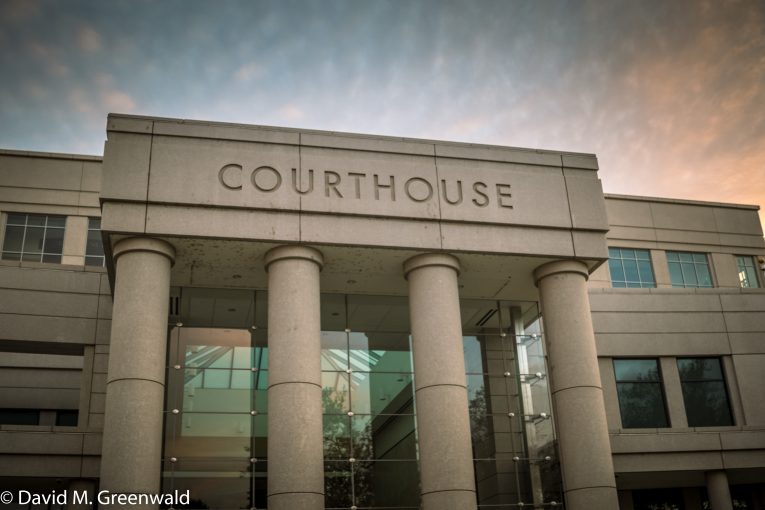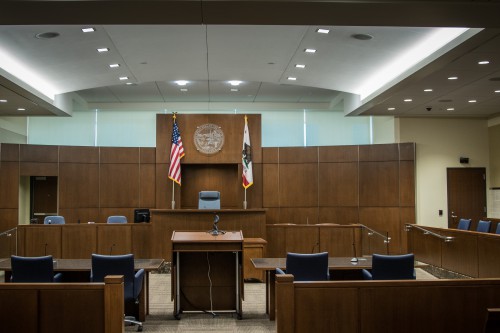
 Consent of Police Search Questioned
Consent of Police Search Questioned
By Jenean Docter
An evidentiary hearing in the case of Henry Melvin Hughey—a man accused of selling methamphetamine to a woman inside Cache Creek Casino—was heard in Department 9 on Friday afternoon. A visiting judge supervised the proceedings.
Mr. Hughey arrived at the courtroom more than 15 minutes late, for unknown reasons. The matter began without him present.
The prosecution cited a surveillance video in which Mr. Hughey may be seen handing a “clear plastic baggie,” which they claimed held methamphetamine in the form of a “white powder,” to a woman. However, the woman cannot be seen passing anything to Mr. Hughey—a typical “drug-deal” would require the buyer to give payment to the seller.
When contacted later, the woman denied having been “under the influence” of methamphetamine, or purchasing any drugs. Deputy Public Defender Jonathan Opet noted “if the woman had drugs, they [the police] should’ve 
searched her.”
However, the crux of the discussions centered around the consensuality—or lack thereof—of the search conducted upon Mr. Hughey by police officers while inside the casino.
The officer who searched Mr. Hughey was called to testify as a witness for the prosecution.
Mr. Opet, in cross-examination, presented to the prosecution and the witness a still shot taken from the casino’s video surveillance footage.
The witness affirmed that he was able to identify himself, standing directly behind Mr. Hughey. He mentioned that another officer was also present, although he was not shown in the image.
The witness claimed that he was putting Mr. Hughey into an initial position so that he would be able to search him.
Noting that the witness placed his right hand atop his gun while speaking to Mr. Hughey, Mr. Opet inquired as to whether or not the witness consciously remembered this positioning. The witness claimed that he left his hand atop his weapon because he felt afraid of Mr. Hughey.
Yet, as Mr. Opet noted, it was more likely Mr. Hughey who felt most threatened in this situation. After all, “the average person would feel threatened” when being held by a police officer maintaining contact with potentially lethal weapon.
“He didn’t say he didn’t want to be searched,” the prosecution replied when questioned regarding the consensuality of the search conducted upon Mr. Hughey by the witness. Mr. Opet maintained that Mr. Hughey did not want to be searched, and that there was no reason for the witness to have believed that Mr. Hughey had a weapon on his person at the time.
Furthermore, the prosecution claimed that since Mr. Hughey had “already consented” to the search—apparently, by not outwardly refusing to be searched—the witness did not have to tell Mr. Hughey that he was free to leave.
However, Mr. Hughey’s testimony had already revealed that he initially “said no to the search.” According to the defense, a search is nonconsensual if it is not paired with reasonable suspicion.
The witness held that his “job is to investigate things” and that the search was not an act of coercion. Because the officers believed the situation at hand was that of a “typical narcotics crime,” the witness held that “there was reasonable suspicion” to temporarily detain Mr. Hughey in order to determine if a crime had occurred.
Since five officers were involved in the search of Mr. Hughey, Mr. Opet claimed that “a reasonable person would think they’re being detained,” since the “factors weigh closer to detention.”
In addition, Mr. Opet questioned the legality of detaining Mr. Hughey inside of the casino. Since individuals can be excluded from entering Cache Creek Casino, Mr. Opet held that it constitutes a private space, and not a public space.
Moreover, no testimony was heard regarding whether or not the location was a “typical drug dealing location.”
The judge noted that “from all the testimony, the encounter was less than a couple of minutes.” He held that the situation “seems to approximate a consensual encounter.”
“A reasonable person might argue that he wasn’t free to leave, but the officer was justified in detaining him,” the court concluded.
The case is set to be heard by a jury on Monday, March 19, at 8:30 AM in Department 11. The trial is estimated to last two days.
